– Det er nødvendig å ta imot all den hjelpen du trenger
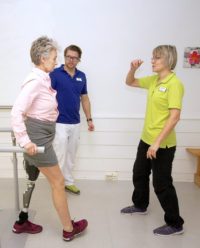
Bare etter noen uker på rehabiliteringen på Fram Unicare på Rykkin, lærte Benedicte seg å gå med protese. Foto: Marte Nordahl Benedicte sto på ski for første gang etter amputasjonen sammen med andre deltakere på langrennshelgen på Venabu. Her sammen med Geir Arne Hageland. Mestringsfølelsen var høy. Foto: Marte Nordahl – Mitt største ønske med […]
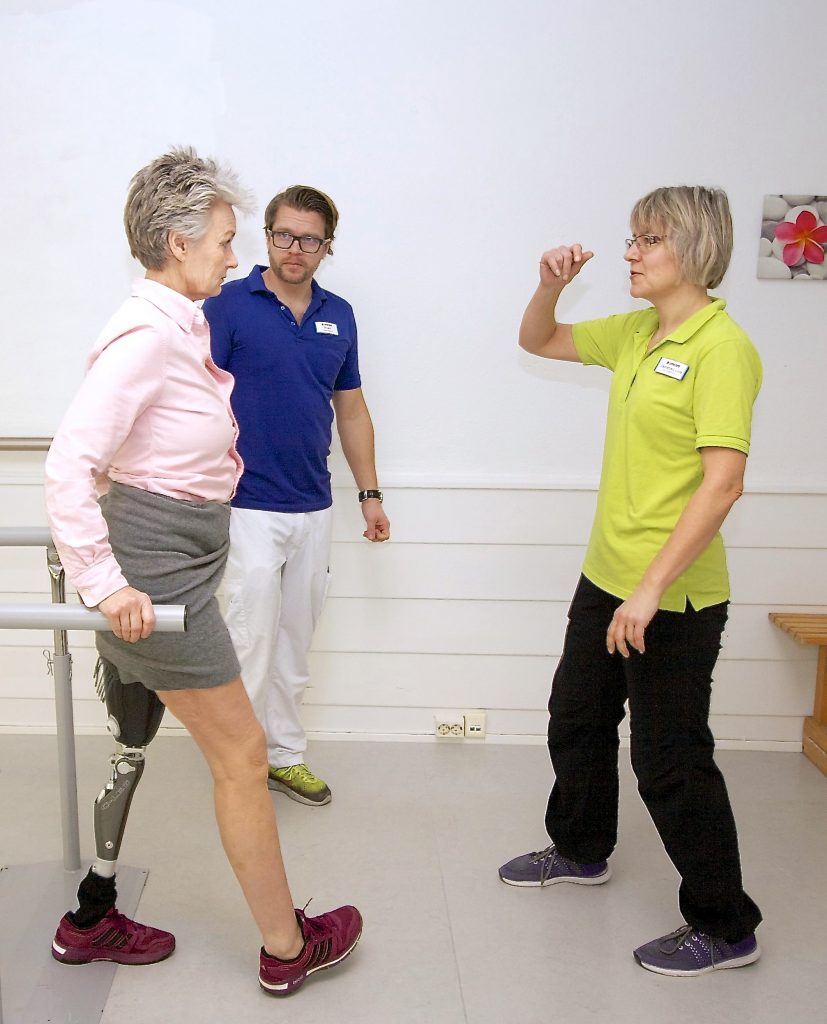
Bare etter noen uker på rehabiliteringen på Fram Unicare på Rykkin, lærte Benedicte seg å gå med protese.
Foto: Marte Nordahl
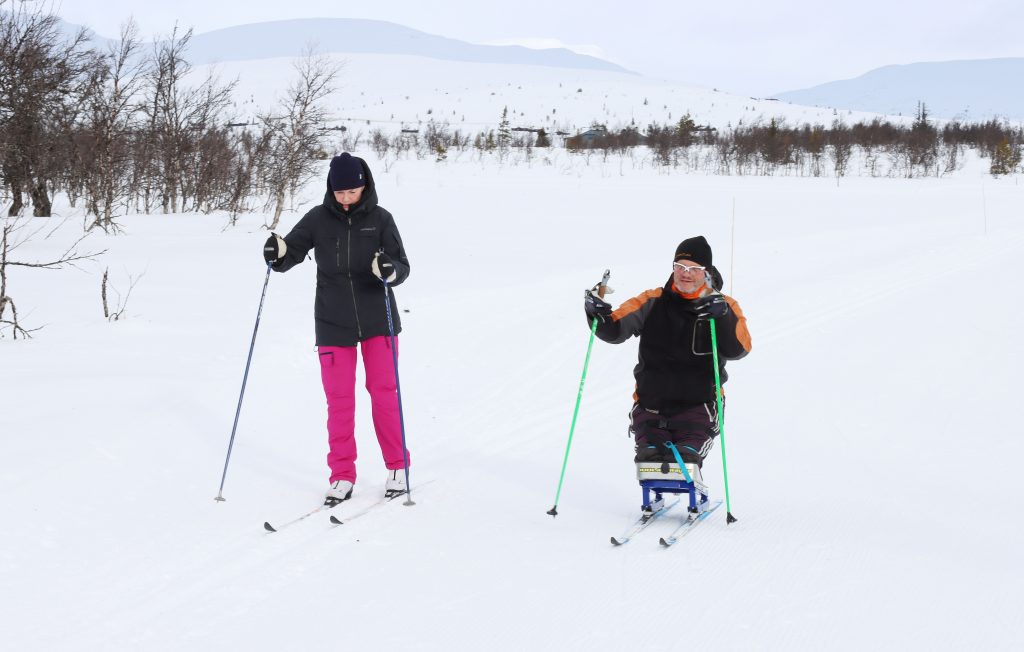
Benedicte sto på ski for første gang etter amputasjonen sammen med andre deltakere på langrennshelgen på Venabu. Her sammen med Geir Arne Hageland. Mestringsfølelsen var høy.
Foto: Marte Nordahl
– Mitt største ønske med likepersonsarbeidet er å rådføre og hjelpe nye amputerte til å kunne leve et så fullgodt og aktivt liv som mulig.
Av Marte Nordahl
Benedicte deltok på likepersonskurs i fjor høst. Arbeidet synes hun er interessant og givende. Til nå har hun rukket å utføre en gruppesamtale i lavvoen utenfor Unicare Fram på Rykkinn, i tillegg til samtaler på sykehus og over telefon.
– Som likeperson ønsker jeg å gi amputerte og protesebrukere et bedre syn på livet. Håpet mitt er å kunne bidra med verdifull rådføring, i tillegg til å dele erfaringer som jeg har kommet sterkere ut av selv. At de får livsgleden tilbake og evne til å se framover er verdt arbeidet.
Låramputert etter en skiulykke
Benedicte Finnema ble låramputert i oktober 2019 etter en skiulykke i Hemsedal. Fire uker etter amputasjonen fikk hun tilpasset den første protesen.
– Jeg lærte at hvis jeg skulle klare å komme meg opp på beina igjen, måtte jeg legge inn mye viljestyrke og gjøre den tunge jobben selv. Siden jeg har vært en idrettsjente hele livet var det naturlig for meg å ta i et tak. Allikevel har det vært en tøff vei mot målet, sier hun.
Likheter skaper tillit
Når Benedicte kommer inn døra med vanlig jeans og boots, ser de selv at det er mulig å komme seg opp på beina og lære å leve med en amputasjon.
– At jeg selv har erfart det de nå går gjennom, gir tillit og er forhåpentligvis til god hjelp. Det er viktig å ha noen å støtte seg til som har vært gjennom det samme. Under likepersonssamtalen passer jeg på at vedkommende får stille spørsmål. Jeg lytter til deres tanker omkring amputasjonen og kommer med råd og støtte.
Mange har det tøft
– Nyamputerte har mange praktiske områder de må sette seg inn i som de ofte ikke har kunnskap om. Alt fra sårbehandling, hygiene, allmenntilstand, protesetilpasning, til hvor de kan søke hjelp og hvilken ortopediingeniør de skal velge.
– Siden mange befinner seg i en tilstand av sjokk og sorg etter en amputasjon, får de heller ikke med seg alt som blir sagt. Derfor repeterer jeg ofte en del av det de spør om, sier Benedicte.
Lære å leve igjen
– I likepersonssamtalene framhever jeg at når du først lærer å leve med en amputasjon og en protese, forsvinner det tunge mørket. Samtidig forteller jeg dem at de ikke trenger å være positiv hele tiden. Det er menneskelig å ha vanskelige følelser.
Benedicte hjelper også nye protesebrukere til å mestre den nye situasjonen.
– Å lære dem å akseptere og å gå videre og få lyst til å leve, er noe jeg arbeider målrettet med. Jeg videreformidler at uansett hvor sterk du har vært tidligere i livet, er det helt vesentlig og slett ikke skamfullt å be om hjelp. For meg har det vært helt avgjørende å ta imot hjelp etter ulykken, og ikke minst etter amputasjonen.
Informerer om Momentum
I likepersonssamtalene informerer Benedicte om det gode felleskapet og alle mulighetene som finnes for amputerte. Sågar om alle arrangementene og prosjektene som Momentum arbeider med.
– Momentum er en flott forening som arbeider for at vi skal ha en så trygg, aktiv og god hverdag som mulig. Gjennom Momentum fikk jeg selv vite om alle rettighetene jeg har som amputert. Etter hvert lærer du også at det finnes mange individuelle valgmuligheter og flere ulike proteser å velge mellom. Videre informerer jeg dem om at det er fritt valg av ortopediingeniør.
Aktiviteter til stor glede
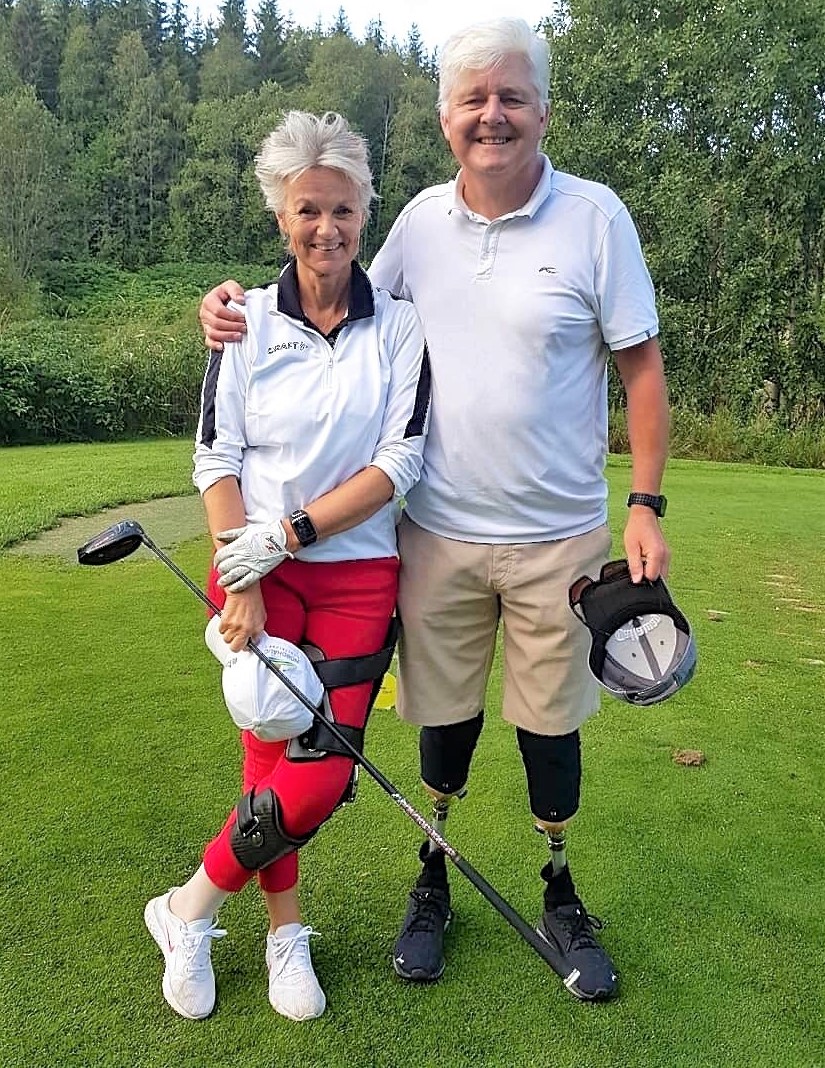
Benedicte deltar gjerne på så mange aktivitetsturer som mulig. Golf er en av favorittene.
Privat foto.
På Hjerkinn var hun lykkelig over å få en fem timers lang ridetur i idyllisk landskap med utsikt utover Rondane og Dovrefjell.
Foto. Geir Arne Hageland.
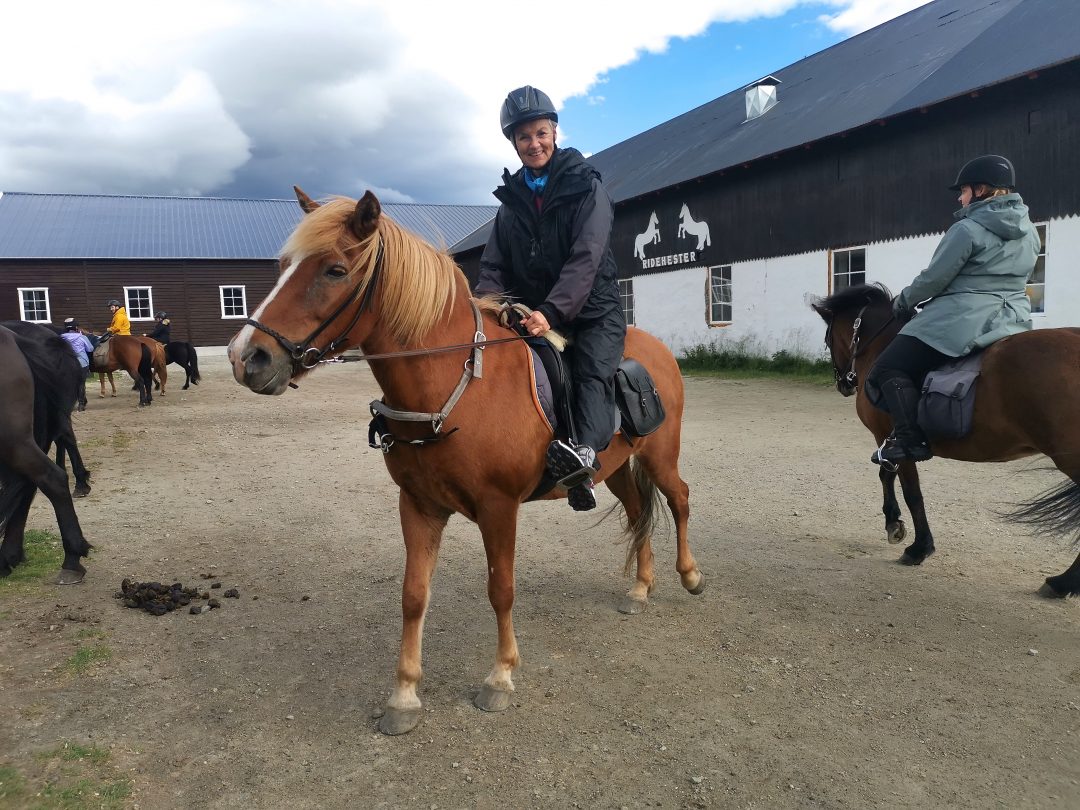
– Jeg passer også på å spørre dem om hvilke aktivtiter de har utført tidligere og ønsker å gjøre framover. Jeg poengterer at små delmål er viktig for å kunne oppleve mestringsglede.
Benedicte sin hverdag består av hvile, mat og aktiviteter. Hun anvender en ganske høy aktivitetsprotese som fungerer godt til ulike hverdags- og fritidsaktiviteter. Innendørs benytter hun rullestol for å hvile kroppen mest mulig innimellom aktivitetsskjemaet.
– Jeg går turer med hunden i snitt 9,8 kilometer hver dag, som jeg deler opp i tre økter. Krykkene er erstattet med en hendig stav for å forhindre slagside. Jeg lærer meg også å spille golf igjen, og trener og svømmer på fysioterapien en til to ganger i uken. Målet mitt er også å gå på langrenn, sier hun.
Føler seg hel
– Det var først da jeg endelig ble amputert at livet mitt ble bedre. I dag føler jeg meg hel. Jeg er en fysisk person som liker å strekke meg for å nå nye mål. Alle aktivitetene jeg klarer å utføre gir meg en enorm glede og mestringsfølelse. I begynnelsen arbeidet jeg hardt for å gå uten krykker ti meter. Jeg gråt mye, men visste at det kom til å gå over.
– Jeg synes det er fint at det er så lav terskel for å delta på arrangementer via Momentum. Jeg har vært heldig som får treffe så mange nye mennesker på de mange ulike arrangementene og aktivitetene jeg deltar på gjennom Momentum. Jeg føler en sterk tilhørighet til foreningen, sier Benedicte
Les om likepersonstilbudet